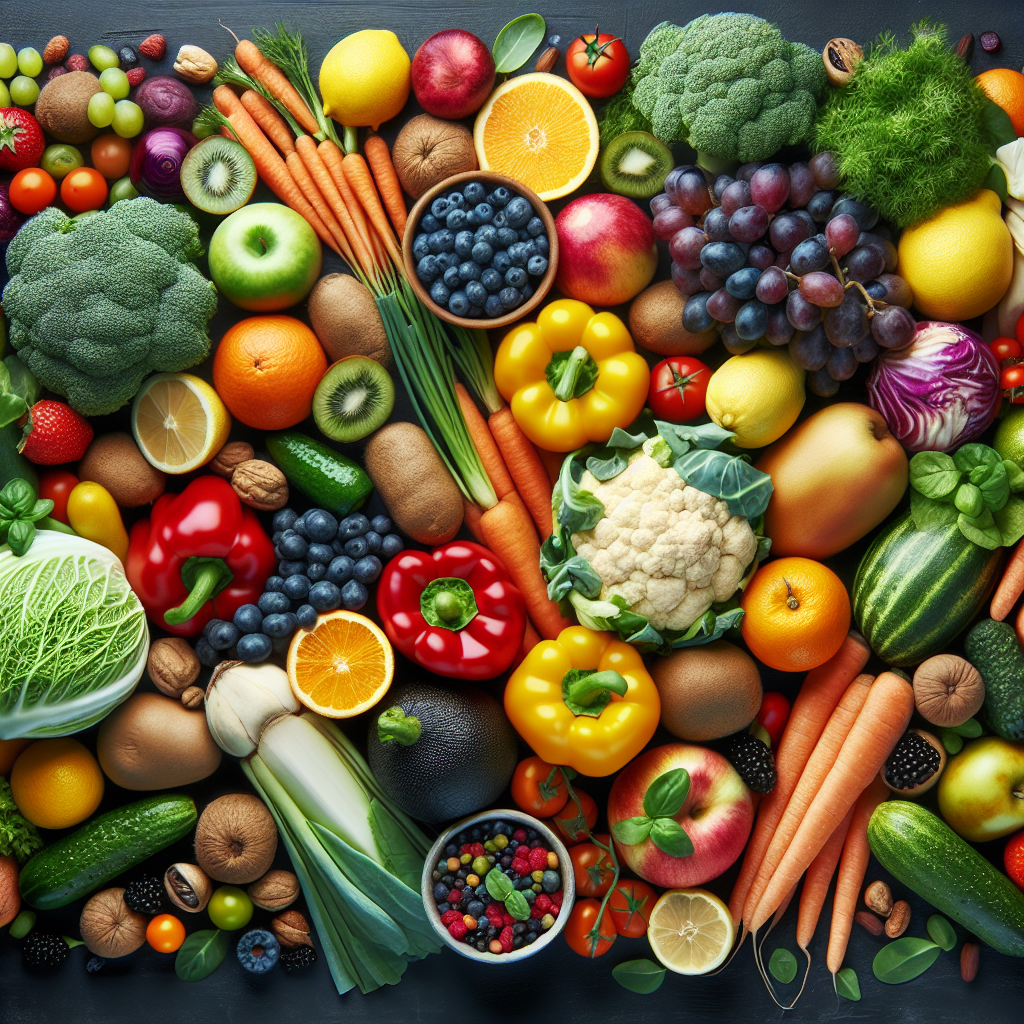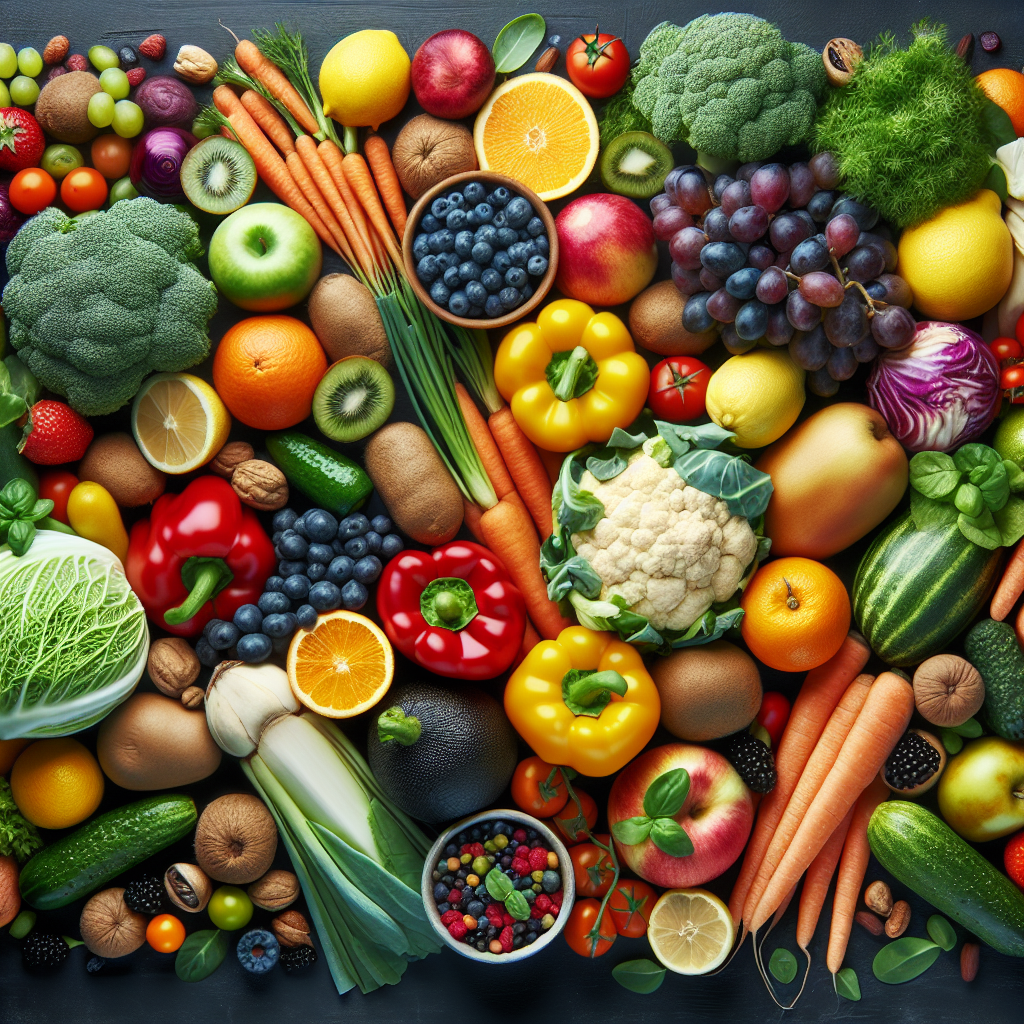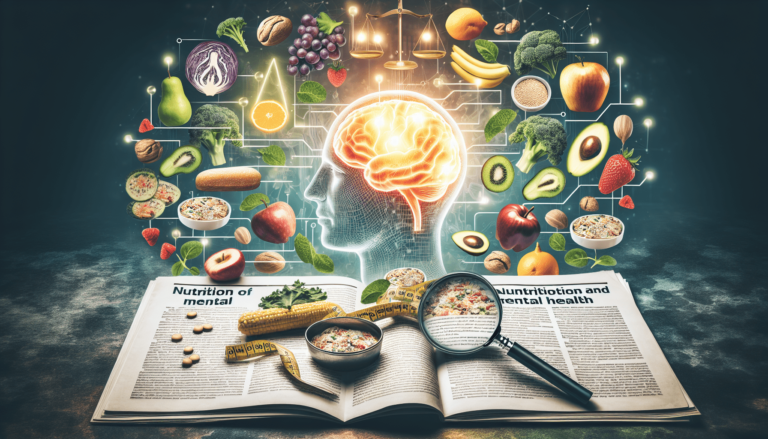The Link Between Diet And Mental Well-being
Did you know that what you eat can have a significant impact on your mental well-being? It turns out that there is a strong link between your diet and your mental health, and making simple changes to your eating habits can make a world of difference. Research has shown that certain nutrients and foods can positively affect your mood, reduce symptoms of depression and anxiety, and even improve cognitive function. In this article, we will explore the fascinating connection between diet and mental well-being, and provide some practical tips to help you optimize your diet for a happier and healthier mind.
The Impact of Diet on Mental Health
In recent years, there has been growing recognition of the important relationship between diet and mental health. Research has shown that the foods we eat not only affect our physical well-being but also have a significant impact on our mental well-being. Nutritional deficiencies, as well as the types and amounts of macronutrients and micronutrients we consume, can play a key role in determining our mental health.
Nutritional Deficiencies and Mental Health
Nutritional deficiencies can have a profound impact on our mental health. When our bodies do not receive the necessary nutrients, it can lead to a range of mental health issues such as depression, anxiety, and even cognitive decline. For example, deficiencies in B vitamins, particularly vitamins B12 and folate, have been linked to an increased risk of depression. Low levels of omega-3 fatty acids, which are essential for brain health, have also been associated with a higher risk of depression and other mental health disorders.
The Role of Macronutrients
Macronutrients, including carbohydrates, proteins, and fats, are vital for our overall health and well-being. They provide the energy our bodies need to function optimally, including our brain. Carbohydrates, in the form of complex carbohydrates found in whole grains, provide a steady source of glucose to the brain, supporting cognitive function and mood regulation. Proteins are crucial for the production of neurotransmitters, the chemical messengers in our brains that regulate mood. Healthy fats, such as those found in avocados and nuts, are important for brain health and can help reduce the risk of mental health disorders.
The Importance of Micronutrients
In addition to macronutrients, micronutrients also play a critical role in mental well-being. These include vitamins, minerals, and antioxidants, which support various physiological processes in the body and brain. For example, vitamin D, often referred to as the sunshine vitamin, has been found to play a role in mood regulation and the prevention of depression. Magnesium is another important mineral that is involved in over 300 biochemical reactions in the body, including those related to mood and sleep. Antioxidants, such as vitamin C and E, help protect our brain cells from damage caused by oxidative stress and inflammation.
The Influence of Gut Health on Mental Well-being
Emerging research has highlighted the significant impact of gut health on mental well-being. The gastrointestinal tract is home to trillions of microbes, collectively known as the gut microbiome, which play a crucial role in digestion, nutrient absorption, and immune function. Recent studies have found that the health and diversity of the gut microbiome can influence brain function and mental health. Imbalances in gut bacteria, known as dysbiosis, have been associated with conditions such as depression, anxiety, and even neurodevelopmental disorders like autism.
Specific Diets for Mental Well-being
When it comes to promoting mental well-being through diet, several specific eating patterns have shown promising results.
The Mediterranean Diet
The Mediterranean diet, inspired by the traditional eating habits of countries bordering the Mediterranean Sea, has long been associated with numerous health benefits, including improved mental well-being. It emphasizes whole foods such as fruits, vegetables, whole grains, legumes, healthy fats (such as olive oil and nuts), and moderate amounts of lean protein (including fish and poultry). Numerous studies have found that following a Mediterranean-style diet can reduce the risk of depression and improve overall mood and cognitive function.
The DASH Diet
The DASH (Dietary Approaches to Stop Hypertension) diet is another eating pattern that has been linked to better mental health. Originally developed to lower blood pressure, the DASH diet is rich in fruits, vegetables, whole grains, lean proteins, and low-fat dairy products. This dietary approach is also low in saturated and trans fats, as well as sodium. Studies have shown that adhering to the DASH diet can help reduce symptoms of depression and anxiety and may even protect against the development of mental health disorders.
The Paleo Diet
The Paleo diet, also known as the Paleolithic or caveman diet, is based on the types of foods our ancestors ate during the Paleolithic era. It focuses on lean meats, fish, fruits, vegetables, nuts, and seeds while excluding grains, dairy products, and processed foods. While there is limited research specifically examining the impact of the Paleo diet on mental health, some studies have suggested that this eating pattern may improve mood and reduce symptoms of anxiety and depression. However, more research is needed to fully understand its effects.
The Ketogenic Diet
The ketogenic diet, which is low in carbohydrates and high in fats, has gained popularity in recent years for its potential health benefits. While initially developed to manage epilepsy, the ketogenic diet has also been explored as a potential intervention for mental health conditions. Some research indicates that the ketogenic diet may have an antidepressant effect and could help improve symptoms of conditions such as bipolar disorder. However, the long-term effects and safety of following a ketogenic diet for mental health purposes are still being investigated.

Foods That Promote Mental Well-being
In addition to following specific dietary patterns, there are certain foods that have been found to promote mental well-being. Including these foods in your diet can provide essential nutrients and support optimal brain function.
Whole Grains and Complex Carbohydrates
Whole grains, such as brown rice, quinoa, and whole wheat bread, are rich in fiber and nutrients that support brain health. They provide a slow and steady release of glucose, which is the primary energy source for the brain. Complex carbohydrates also stimulate the production of serotonin, a neurotransmitter that helps regulate mood and promotes feelings of happiness and well-being.
Fruits and Vegetables
Fruits and vegetables are packed with vitamins, minerals, and antioxidants that are essential for brain health. They provide a wide range of nutrients that support cognitive function, mood regulation, and overall mental well-being. Including a variety of colorful fruits and vegetables in your diet ensures you receive a diverse array of nutrients that support optimal brain function.
Healthy Fats
Healthy fats, such as those found in avocados, nuts, seeds, and fatty fish like salmon, are crucial for brain health. They contain omega-3 fatty acids, which are essential for the structure and function of brain cells. Omega-3s have been linked to a reduced risk of depression and other mental health disorders. Including these healthy fats in your diet can help support optimal brain function and promote mental well-being.
Probiotics and Fermented Foods
Probiotics are beneficial bacteria that can support gut health and contribute to mental well-being. Fermented foods such as yogurt, kefir, sauerkraut, and kimchi are rich sources of probiotics. Research suggests that the gut microbiome and its balance of bacteria can profoundly influence brain function and mental health. Including probiotics and fermented foods in your diet can help support a healthy gut and promote mental well-being.
Nuts and Seeds
Nuts and seeds, including almonds, walnuts, flaxseeds, and chia seeds, are nutrient-dense foods that support brain health. They are rich in healthy fats, fiber, vitamins, and minerals that are essential for optimal cognitive function and mood regulation. Incorporating a variety of nuts and seeds into your diet can provide a range of nutrients that support mental well-being.
Lean Protein Sources
Protein is essential for the production of neurotransmitters, which regulate mood and cognitive function. Including lean protein sources such as chicken, fish, tofu, and legumes in your diet can help support optimal brain function and promote mental well-being. Aim to include a variety of protein sources in your meals to ensure you receive a diverse array of amino acids that are necessary for neurotransmitter production.
Dark Chocolate
Dark chocolate, particularly varieties with a high cocoa content (70% or more), can provide numerous benefits for mental well-being. It contains antioxidants, flavonoids, and other compounds that have been shown to enhance mood, reduce anxiety, and improve cognitive function. Enjoying a piece of dark chocolate as a treat can be a delicious way to support your mental well-being.
Food Additives and Mental Health
While certain foods can promote mental well-being, it’s important to be mindful of the impact of food additives on mental health. Some common food additives have been linked to negative effects on mental well-being.
Artificial Sweeteners
Artificial sweeteners, such as aspartame, sucralose, and saccharin, are commonly used as sugar substitutes in various food and beverage products. Research suggests that these sweeteners may have negative effects on mental health, including an increased risk of depression, anxiety, and even cognitive decline. It is advisable to limit your consumption of artificial sweeteners and opt for natural sweeteners such as stevia or honey instead.
Food Dyes
Artificial food dyes, commonly used to enhance the appearance of processed foods, have also been linked to mental health issues. Some studies have found a potential association between food dyes and attention-deficit/hyperactivity disorder (ADHD) symptoms in children. While more research is needed to establish a definitive link, it may be prudent to avoid foods and beverages that contain artificial food dyes, especially if you or your child are sensitive to them.
Monosodium Glutamate (MSG)
Monosodium glutamate, commonly known as MSG, is a flavor enhancer used in many processed foods. While some people may be more sensitive to its effects than others, MSG has been associated with various symptoms, including headaches, dizziness, and even mood disturbances. If you notice any adverse effects after consuming foods containing MSG, it may be best to avoid them or limit your intake.

The Effects of Sugar and Caffeine on Mental Health
Sugar and caffeine are two substances that are commonly consumed in our diets. While they can provide temporary boosts in energy and mood, their excessive consumption can have detrimental effects on mental health.
The Impact of Sugar on Mood and Mental Health
Consuming excessive amounts of sugar has been linked to a range of mental health issues, including depression and anxiety. Sugar consumption leads to fluctuations in blood sugar levels, which can cause mood swings, irritability, and fatigue. Additionally, high sugar intake has been associated with inflammation, oxidative stress, and impaired brain function, all of which have negative effects on mental well-being. It is important to moderate your sugar intake and opt for natural sources of sweetness, such as fruits, instead of refined sugars.
The Role of Caffeine in Anxiety and Sleep Disorders
Caffeine is a stimulant found in coffee, tea, energy drinks, and many other commonly consumed beverages. While small to moderate amounts of caffeine can provide a temporary boost in energy and mood, excessive consumption can lead to anxiety, irritability, and sleep disturbances. Caffeine can disrupt normal sleep patterns and negatively affect the quality and duration of sleep, leading to fatigue and impaired mental function. It is advisable to moderate your caffeine intake, particularly in the afternoon and evening, to support a good night’s sleep and promote mental well-being.
The Gut-Brain Connection
The gut-brain connection refers to the bidirectional communication between the gut and the brain. It involves complex interactions between the gut microbiome, the central nervous system, and the immune system, which can influence brain function and mental health.
The Gut Microbiome and Mental Health
The gut contains millions of bacteria that make up the gut microbiome, which plays a crucial role in overall health, including mental well-being. These bacteria produce neurotransmitters, including serotonin and dopamine, which are essential for mood regulation. They also help regulate inflammation and support a healthy immune system, both of which are crucial for optimal brain function. A healthy gut microbiome is essential for mental well-being, and nurturing your gut health through a balanced diet and lifestyle can contribute to a healthier mind.
Leaky Gut Syndrome and Mental Well-being
Leaky gut syndrome is a condition characterized by increased permeability of the intestinal lining, allowing toxins and bacteria to leak into the bloodstream. This can trigger inflammation and immune responses that can impact brain function and mental health. While the exact relationship between leaky gut syndrome and mental well-being is still being explored, there is evidence to suggest that addressing gut health issues, such as leaky gut, can have a positive impact on mental well-being. Consuming a diet rich in fiber, probiotics, and prebiotics, along with adopting stress management techniques, can help promote a healthy gut and support mental well-being.
Mindful Eating for Mental Well-being
Practicing mindful eating can be a valuable tool for promoting mental well-being. Mindful eating involves paying attention to the present moment and being fully aware of the food you are eating, the sensations in your body, and your overall experience of eating.
The Benefits of Mindful Eating
Mindful eating can help improve your relationship with food and promote better mental well-being. By being fully present during meals, you can develop a deeper connection with the food you eat, resulting in increased satisfaction and enjoyment. Mindful eating can also help you become more aware of your hunger and fullness cues, preventing overeating and promoting a healthier relationship with food. Additionally, practicing mindfulness during meals can reduce stress and help you develop a more positive mindset towards eating.
Practical Tips for Incorporating Mindful Eating
To incorporate mindful eating into your daily life, try the following practical tips:
- Slow down and savor each bite of your food, focusing on the taste, texture, and aroma.
- Pay attention to hunger and fullness cues, eating until you are satisfied, not overly full.
- Avoid distractions such as television, phones, or computers while eating.
- Chew your food thoroughly and take time to appreciate the flavors and sensations.
- Practice gratitude for the nourishment your food provides and the effort that went into its preparation.
- Listen to your body’s signals of hunger and satiety, rather than following external cues or strict rules.
- Cultivate a non-judgmental attitude towards your eating experience, accepting and embracing all aspects of it.
Incorporating mindful eating into your daily routine can help you establish a healthier relationship with food and promote mental well-being.
The Role of Lifestyle Factors
While diet plays a significant role in mental health, it is important to consider other lifestyle factors that can impact mental well-being.
The Impact of Exercise on Mental Health
Regular physical activity is not only beneficial for physical health but also has a profound impact on mental well-being. Exercise stimulates the release of endorphins, neurotransmitters that promote feelings of happiness and well-being. It can also reduce symptoms of anxiety and depression, improve sleep quality, boost self-esteem, and enhance cognitive function. Engaging in regular exercise, whether it’s walking, running, dancing, or participating in team sports, can have significant positive effects on mental health.
The Importance of Adequate Sleep
Sleep plays a vital role in mental well-being. Chronic sleep deprivation has been linked to an increased risk of mental health disorders, including depression and anxiety. During sleep, our brains go through important restorative processes that help regulate mood, consolidate memories, and process emotions. It is recommended to aim for 7-9 hours of quality sleep each night to support optimal mental well-being. Establishing a consistent sleep routine, creating a sleep-friendly environment, and practicing relaxation techniques can help improve sleep quality and promote mental well-being.
Stress Management and Mental Well-being
Chronic stress can have a detrimental impact on mental health, contributing to the development or worsening of conditions such as anxiety and depression. Finding healthy ways to manage stress is essential for promoting mental well-being. Practicing stress management techniques, such as mindfulness meditation, deep breathing exercises, yoga, and engaging in hobbies or activities that bring joy and relaxation can help reduce stress levels and support mental well-being.
The Influence of Social Connections on Mental Health
Human beings are social creatures, and social connections play a crucial role in mental well-being. Maintaining healthy and supportive relationships with family, friends, and communities can provide a sense of belonging, support, and fulfillment. Social connections can help reduce feelings of loneliness, promote positive emotions, and provide a network of support during challenging times. Nurturing and investing in meaningful relationships is an important aspect of mental well-being.
Addressing Mental Health Conditions Through Diet
While diet can have a significant impact on mental well-being, it is important to note that it is not a replacement for professional medical care. However, certain dietary interventions may complement traditional treatments for mental health conditions.
Depression and Diet
Depression is a common mental health disorder that can significantly impact a person’s quality of life. While diet alone is not a cure for depression, certain dietary approaches may help reduce symptoms and support overall mental well-being. The Mediterranean diet, with its emphasis on whole foods, healthy fats, and lean proteins, has shown promising results in reducing depressive symptoms. Additionally, increasing omega-3 fatty acid intake through sources such as fatty fish, flaxseeds, and walnuts may have a positive impact on mood.
Anxiety Disorders and Dietary Interventions
Anxiety disorders, characterized by excessive worry and fear, can significantly impact a person’s daily life. While diet alone cannot cure anxiety disorders, certain dietary interventions may help reduce symptoms and support overall mental well-being. Avoiding or reducing caffeine, as well as consuming foods rich in magnesium and B vitamins, may have a calming effect on anxiety. Additionally, including probiotics and fermented foods that support gut health may contribute to improved anxiety symptoms.
Attention-deficit/hyperactivity disorder (ADHD) and Nutrition
ADHD is a neurodevelopmental disorder characterized by inattention, hyperactivity, and impulsivity. While diet alone cannot cure ADHD, several nutritional strategies may help manage symptoms and support optimal brain function. Ensuring a balanced intake of macronutrients and micronutrients, such as omega-3 fatty acids, vitamin D, iron, and zinc, may be beneficial for individuals with ADHD. Reducing the consumption of artificial food dyes and additives that can exacerbate symptoms is also recommended.
Bipolar Disorder and Dietary Approaches
Bipolar disorder is a mental health condition characterized by extreme mood swings, including episodes of mania and depression. While diet cannot replace medication or therapy for bipolar disorder, certain dietary approaches may help support overall mental well-being. Following a balanced diet that includes a good balance of macronutrients and micronutrients is crucial for individuals with bipolar disorder. Additionally, managing blood sugar levels by consuming complex carbohydrates, avoiding excessive sugar consumption, and minimizing caffeine intake may support mood stability.
Conclusion
The impact of diet on mental health cannot be overstated. Nutritional deficiencies, macronutrient and micronutrient imbalances, gut health, food additives, sugar, and caffeine can all affect our mental well-being. However, by following specific diets for mental well-being, incorporating foods that promote mental well-being, being mindful of food choices, managing stress, exercising regularly, prioritizing sleep, nurturing social connections, and considering dietary interventions for specific mental health conditions, we can take significant steps towards promoting optimal mental well-being. Remember, while diet plays an essential role, it is also crucial to seek professional help for mental health concerns and follow appropriate treatment plans. By prioritizing both our physical and mental well-being, we can achieve a more balanced and fulfilling life.







